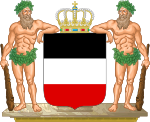North German Reichstag Norddeutscher Reichstag | |
|---|---|
| Legislative body of Germany | |
 | |
| Type | |
| Type | |
| History | |
| Established | 18 August 1866 |
| Disbanded | 18 January 1871 |
| Preceded by | Federal Convention |
| Succeeded by | Imperial Reichstag |
| Seats | 382 (at dissolution) |
| Elections | |
| Direct competitive elections | |
First election | February 1867 |
Last election | 31 August 1867 |
| Meeting place | |
 | |
| Prussian House of Lords, Berlin | |
| Constitution | |
| North German Constitution | |
The Reichstag (German: [ˈʁaɪçstaːk] ) of the North German Confederation was the federal state's lower house of parliament. The popularly elected Reichstag was responsible for federal legislation together with the Bundesrat, the upper house whose members were appointed by the governments of the individual states to represent their interests. Executive power lay with the Bundesrat and the king of Prussia acting as Bundespräsidium, or head of state.[1] The Reichstag debated and approved or rejected taxes and expenditures and could propose laws in its own right. To become effective, all laws required the approval of both the Bundesrat and the Reichstag. Voting rights in Reichstag elections were advanced for the time, granting universal, equal, and secret suffrage to men above the age of 25.[2]
When the German Empire was established in 1871, the North German Reichstag formed the basis of the new Reichstag of the German Empire.
- ^ Huber, Ernst Rudolf (1988). Deutsche Verfassungsgeschichte seit 1789. Band III: Bismarck und das Reich [German Constitutional History since 1789. Vol. III: Bismarck and the Reich] (in German) (3rd ed.). Stuttgart: W. Kohlhammer. p. 657.
- ^ "Wahlgesetz für den Reichstag des Norddeutschen Bundes" [Election Law for the Reichstag of the North German Confederation]. de.Wikisource (in German). Retrieved 21 October 2022.